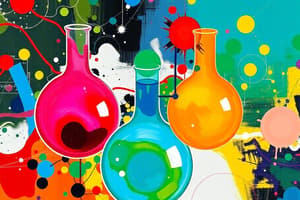Podcast
Questions and Answers
In which phase of water are the molecules close together but able to move around to some extent?
In which phase of water are the molecules close together but able to move around to some extent?
- Liquid (correct)
- Gas
- Plasma
- Solid
Which of the following phase conversions is usually involved in distillation?
Which of the following phase conversions is usually involved in distillation?
- Liquid to solid
- Solid to liquid
- Liquid to gas (correct)
- Gas to solid
Filtration usually involves separating which phases from a mixture?
Filtration usually involves separating which phases from a mixture?
- Liquid from liquid
- Solid from liquid (correct)
- Liquid from gas
- Solid from gas
Which of the following is a heterogeneous mixture?
Which of the following is a heterogeneous mixture?
The smallest unit of a chemical compound is a(n):
The smallest unit of a chemical compound is a(n):
What is the state of matter for an object that has neither definite shape nor definite volume?
What is the state of matter for an object that has neither definite shape nor definite volume?
Which of the following processes represents a chemical change?
Which of the following processes represents a chemical change?
Which of the following is an example of a physical change?
Which of the following is an example of a physical change?
Which of the following activities involves no chemical change?
Which of the following activities involves no chemical change?
In a chemical change, what statement is true regarding the original materials?
In a chemical change, what statement is true regarding the original materials?
What physical state is iodine at 120°C considering it melts at 114°C and boils at 184°C?
What physical state is iodine at 120°C considering it melts at 114°C and boils at 184°C?
Which of the following changes is indicative of a chemical alteration?
Which of the following changes is indicative of a chemical alteration?
What happens to the compounds obtained as products in a chemical reaction?
What happens to the compounds obtained as products in a chemical reaction?
Which of the following correctly describes a chemical property of gold?
Which of the following correctly describes a chemical property of gold?
What defines a chemical change among the following options?
What defines a chemical change among the following options?
How many of the following are pure compounds: sodium, sugar, oxygen, air, iron?
How many of the following are pure compounds: sodium, sugar, oxygen, air, iron?
Which of the following substances is classified as an element?
Which of the following substances is classified as an element?
What is an example of a homogeneous mixture from the options below?
What is an example of a homogeneous mixture from the options below?
Which statement accurately describes a characteristic of pure substances?
Which statement accurately describes a characteristic of pure substances?
Which phase of water has the molecules arranged closely in rigid positions?
Which phase of water has the molecules arranged closely in rigid positions?
Which of the following processes cannot be classified as a physical change?
Which of the following processes cannot be classified as a physical change?
What type of change involves a transformation into a different substance?
What type of change involves a transformation into a different substance?
Which of the following substances is not a pure compound?
Which of the following substances is not a pure compound?
What is a defining property of a solution compared to a compound?
What is a defining property of a solution compared to a compound?
Which of the following statements is correct regarding the boiling point of water?
Which of the following statements is correct regarding the boiling point of water?
Which of the following is an example of a chemical change?
Which of the following is an example of a chemical change?
Which of the following is primarily characterized as a mixture?
Which of the following is primarily characterized as a mixture?
Flashcards are hidden until you start studying
Study Notes
States of Matter
- Gaseous state: no definite shape or volume.
- Liquid state: definite volume but no definite shape.
- Solid state: both definite volume and shape.
- Matter: anything that possesses mass and volume.
Changes in Matter
- Physical changes: alterations that do not affect the chemical composition.
- Examples: boiling water, ironing a shirt, evaporating alcohol.
- Sugar dissolving in coffee is a physical change.
- Chemical changes: transformations that result in new chemical substances.
- Examples: cooking an egg, burning gasoline, fermentation of fruit juice.
- Metal rusting is a chemical change.
Properties of Substances
- Chemical properties: characteristics that involve chemical reactions.
- Gold is considered nonreactive (inert).
- A chemical change can result in substances with different properties.
- Physical properties: characteristics identifiable without changing the substance.
- Water’s boiling point (100°C) is a physical property.
Classifications of Matter
- Pure substances: materials with uniform composition, such as elements and compounds.
- Elements: pure substances that cannot be broken down; examples include aluminum and oxygen.
- Compounds: substances formed from chemical combinations of elements; examples include water (H2O) and ammonia (NH3).
- Mixtures: combinations of two or more substances that maintain their individual properties; can be homogeneous (uniform composition) or heterogeneous (distinct components).
Processes and Characteristics
- Filtration: method for separating solids from liquids.
- Distillation: process typically involving the conversion of a liquid to gas and back, used to separate components based on differences in boiling points.
- Molecules in different states of water:
- Solid: molecules close and rigid.
- Liquid: molecules close yet mobile.
- Gas: molecules far apart and move freely.
True/False Statements
- An element can consist only of single atoms: False (can form diatomic molecules).
- A solid substance is matter: False (solid substances are indeed matter).
- Juice freezing is a physical change: True.
- Boiling water involves a chemical change: False (it’s a physical change).
Additional Notes
- Compounds have a constant composition, while mixtures can vary.
- Homogeneous mixtures are also known as solutions.
- Only burning a substance constitutes a chemical change, while melting or boiling involves physical changes.
Studying That Suits You
Use AI to generate personalized quizzes and flashcards to suit your learning preferences.




